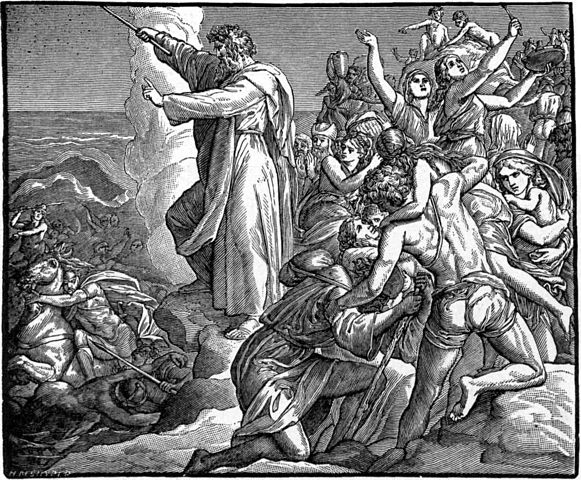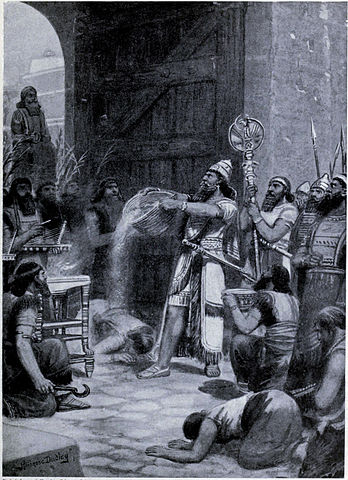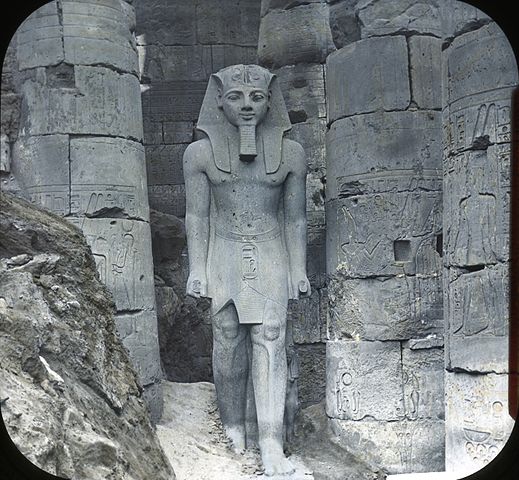
Moses commanding the waters of the Red Sea to return and drown the chariot army of Pharaoh. Illustration from Bible Pictures and What They Teach Us by Charles Foster, 1897. Image: Wikimedia Commons.

Moses commanding the waters of the Red Sea to return and drown the chariot army of Pharaoh. Illustration from Bible Pictures and What They Teach Us by Charles Foster, 1897. Image: Wikimedia Commons.
I have recently published a book that answers common objections to the historicity of the Hebrew Exodus from Egypt:
Between Migdol and the Sea: Crossing the Red Sea with Faith and Science
by Carl Drews, 2014
It's fairly common for bloggers to get a hold of Israel Finkelstein and Neil Silberman's minimalist book The Bible Unearthed (2001) and conclude that the case is closed; the biblical Book of Exodus is fiction. John from Chicago, posting as blogger Kmtsesh, echoes some of the familiar objections in his blog from April 28, 2012: "Exodus: Fact or Fiction?" Kmtsesh boldly declares near the end of his blog:
The events of Exodus, as portrayed in the Old Testament, never happened.
The qualifying phrase "as portrayed in the Old Testament" allows that statement to be technically correct if just one small detail of the biblical account does not match up with historical findings. Anyone can make the declaration above without adding anything useful to the discussion. Oddly enough, Finkelstein and Silberman avoid claiming in The Bible Unearthed that the Exodus never happened. So what did actually happen 3,000 years ago? Where did this ancient story come from?
Critical thinking requires reading what the other side has to say; in this case, there are reputable biblical scholars and historical evidence supporting the reality of the narrative presented in the biblical book of Exodus. My book summarizes that evidence in Chapter 10 Did the Exodus Really Happen? Yes. A list of 169 references begins on page 313. Some highlights from the book:
I have read Finkelstein and Silberman's book The Bible Unearthed (2001) carefully and I am familiar with their claims. My Chapter 9 Confronting the Minimalists provides an extensive rebuttal to their arguments against the historicity of the Exodus. Chapter 11 provides a detailed chronology of the events surrounding the Hebrew Exodus from Egypt. I place the Exodus in 1250 BC, or in the range 1251 - 1242 BC if you prefer error bars.

Shalmaneser I pours out the dust of Arina before his god Ashu. Image: Wikimedia Commons.
The Levant and Canaan were NOT under the solid control of either Egypt or the Hittites in 1250 BC. At most the two empires had safe passage along the coastal strip, not the hill country. Shalmaneser I crushed the Hittite ally Hanigalbat in 1262 BC; this victory threatened both Egypt and Hatti, forcing them to conclude their famous peace treaty in 1258 BC. Shalmaneser was the new big bully on the block. After his ascendance, neither Egypt nor Hatti had solid control over eastern Canaan.
The Bible Unearthed glosses over the profound geopolitical changes that can occur after a single battle, let alone over 100 years. Rameses II conducted a military campaign through Jerusalem and Jericho in 1272 BC. Yes, Rameses recorded attacking Jericho; the same city that William Dever claimed wasn't even there.(Migdol, page 280) After the Hittite peace treaty of 1258 BC, there was a power vacuum in the Judean hill country. The period from 1258 BC until the Merneptah Stele in 1210 BC presented an ideal period for the Israelites to spend a nominal "generation" in the Sinai wilderness, then approach Canaan from the east across the Jordan River. There really was a suitable time and place for the Exodus to occur.
I am at a loss to understand why Finkelstein & Silberman think that the controlled eastern border of Egypt contradicts the Exodus account (Unearthed page 58). The Exodus narrative describes a difficult departure from Egypt proper, not some waltz into the Sinai wilderness. Pharaoh gave Moses leave to depart after the Passover (Exodus 12:31-33), but then he changed his mind one last time. The road beyond Etham was blocked, probably by Egyptian guards. The Israelites got stuck at Pi-Hahiroth, and only a miraculous sea crossing saved them from destruction. The archaeological evidence from the eastern Nile delta and north Sinai confirms the Exodus account. It was hard to get out of Egypt during the New Kingdom against the Pharaoh's wishes! That is exactly what the Bible says.
There is responsible Biblical scholarship dating back at least to Petrie in 1906 that proposes solutions to the egregiously huge number of Israelites. Declaring that there were not two million Israelites who crossed the Red Sea is like declaring that the earth is much older than 6,000 years. Only fundamentalists will disagree with you. Between Migdol and the Sea Chapter 8 calculates a most likely number of 35,750 for the total population. The minimum and maximum estimates are 22,000 and 61,000.
Finkelstein & Silberman are archaeologists, and unfortunately they stick too closely to their own specialty when they should draw from other disciplines instead. Archaeology does not provide the only window onto the past. Ancient literature is valid evidence for past events when that literature is properly understood. The Bible Unearthed fails to recognize that Exodus 14 is an accurate narrative of wind setdown (Migdol Chapter 10 Did the Exodus Really Happen?). What is a realistic description of a rare meteorological event doing in a Bronze Age text? Why does the Greek story of Icarus present such an equally dramatic but scientifically impossible tale? It's hard to make up a good lie, and all the creative energy of King Josiah's bards would have a hard time getting so many hydrological details correct. No - someone saw the wind drive back the sea, and recorded what they witnessed. Of course they gave praise to their God Yahweh for their spectacular deliverance! I would have done the same.

Statue of Ramses II at Luxor, Egypt. Image: Wikimedia Commons.
Biblical literalism leads to the wrong answers; this is true for both theology and history. Although Rameses II may have gone out with the Amun chariot division to pursue the Israelites, the Bible does not clearly state that he personally drowned in the Red Sea. Most likely he would have waited on the western shore while his commanders made their fatal charge into the bottom of the yam suf. Rameses II was 53 years old at the Exodus, no longer the dashing and vigorous young warrior who fought at Kadesh in 1274 BC.
Hazor was destroyed by fire in 1220 BC. The Sea Peoples / Philistines did not arrive in the Levant until shortly before 1180 BC, when Rameses III managed to defeat them in one of the eastern mouths of the Nile River. The Sea People had not yet arrived in Canaan to destroy Hazor by the year 1220 BC. And Hazor is a long way from the Philistine pentapolis anyway. No - Joshua did it.
This article is a brief answer to common objections from Exodus deniers. Between Migdol and the Sea (Drews 2014) presents more extensive analysis of the sea crossing and supporting information for its true history. My sources are listed in the References section of Between Migdol and the Sea, but some important ones are:
The title of this article "Exodus: More Fact Than Fiction" implies that there must be some fiction in the Exodus narrative (even though any positive number is greater than zero). Yes, I meant to make that implication. So - where is the fiction? What parts of the Exodus story are likely fabricated?
First of all, let's eliminate the commonly discussed "errors". These three examples are not intentional fiction by the original author, but honest mistakes that have been perpetuated down through the centuries (too long).
What's left? Well, a careful reader of Exodus will notice that this epic saga is told from a (partially) omniscient point of view; that is, the narrator seems to know what is going on in Pharaoh's palace as well as in the deliberations of Moses and the Israelites. For example, consider Exodus 14:5-7 [ESV]
[5] When the king of Egypt was told that the people had fled, the mind of Pharaoh and his servants was changed toward the people, and they said, �What is this we have done, that we have let Israel go from serving us?� [6] So he made ready his chariot and took his army with him, [7] and took six hundred chosen chariots and all the other chariots of Egypt with officers over all of them.
How did the Hebrew narrator know what Pharaoh said? Unlike the previous verse 14:3, we do not have a direct report from the Lord on what Pharaoh was thinking. It's possible that some person in the Egyptian court eventually reported to the Israelites how Pharaoh changed his mind, but that scenario would require an Egyptian defector to pursue the Israelites into the wilderness and join with them.
The more likely alternative is that Exodus 14:5-7 is reasonable conjecture. Pharaoh promised Moses to let the people go, then suddenly reappeared with his army seven days later. Obviously he changed his mind. The narrator filled in with his best guess as to what happened in the Egyptian royal court. A few other places in the biblical text also reveal a glimpse into conversations and decisions made by Egyptian royalty (see Exodus 10:27-29 and 12:30-32). There could have been palace intrigue that we will never know, like Rameses' mother Queen Tuya urging him to chase after Moses. But strictly speaking, informed conjecture is fiction because it is not based on direct or indirect evidence.
That's not so bad.
Author: Carl Drews
Posted: November 28, 2015
Updated:
Return to Migdol Book.